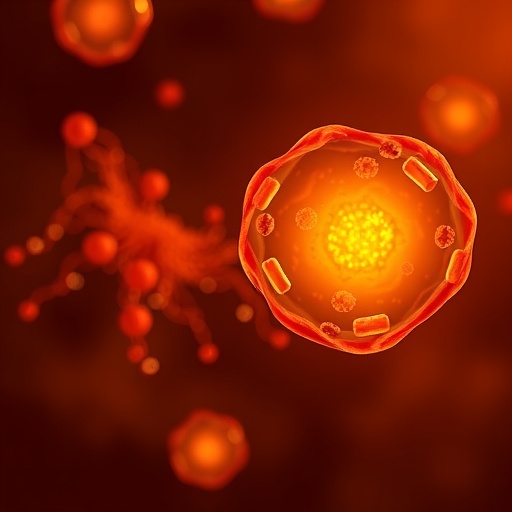In recent groundbreaking research, the complex interplay between circRNAs and ovarian health has been illuminated, particularly focusing on circ_0070987 and its role in polycystic ovarian syndrome (PCOS). This condition, which affects a significant number of women worldwide, is often characterized by hormonal imbalances, irregular menstruation, and the presence of cysts in the ovaries. Researchers Huang and Gao have made strides in understanding how circ_0070987 participates in the regulatory networks that govern ovarian granulosa cells, the somatic cells that surround and support developing oocytes.
The researchers commenced their investigation with a keen interest in the mechanisms leading to the dysfunction of ovarian granulosa cells in PCOS. Previous studies have indicated that these cells play a critical role in ovarian function and fertility, yet the exact molecular pathways involved have remained elusive. This study aims to bridge that knowledge gap by exploring how circ_0070987 influences the fate of granulosa cells through a specific microRNA pathway.
One of the most noteworthy findings of this research is the discovery that circ_0070987 can actively promote pyroptosis, a form of programmed cell death that is often associated with inflammatory processes. Pyroptosis differs significantly from apoptosis, as it is associated with the release of pro-inflammatory cytokines, which can exacerbate conditions like PCOS. The researchers employed a variety of molecular biology techniques to demonstrate that the presence of circ_0070987 in granulosa cells leads to increased levels of pyroptosis, thereby disrupting normal ovarian function.
Moreover, the team uncovered that this circRNA exerts its effects through the miR-139-5p/CDH1 axis. MicroRNAs are small, non-coding RNA molecules that play crucial roles in the regulation of gene expression. In this study, miR-139-5p functions as a negative regulator of CDH1, a gene known to be vital for cell adhesion and maintaining the structural integrity of granulosa cells. The findings revealed that elevated levels of circ_0070987 lead to a decrease in miR-139-5p, which subsequently results in increased expression of CDH1.
The implications of these findings are profound, suggesting that targeting the circ_0070987/miR-139-5p/CDH1 axis could offer novel therapeutic avenues for addressing PCOS. Current treatments for PCOS primarily focus on symptom management rather than addressing the underlying molecular causes. With deeper insights into the molecular mechanisms driving granulosa cell dysfunction, future researchers may be able to develop targeted therapies that restore normal cell function and improve fertility outcomes for women suffering from PCOS.
Furthermore, the study’s findings may pave the way for further research into other circRNAs involved in ovarian physiology. As the field of circRNA biology continues to expand, it is becoming increasingly clear that these molecules may play critical roles in a variety of biological processes, not
Tags: circ_0070987 and PCOScircRNA in ovarian healthhormonal imbalances in womeninflammatory processes in ovarian healthmicroRNA pathways in fertilityovarian function and cell deathovarian granulosa cells dysfunctionprogrammed cell death mechanismspyroptosis in ovarian cellsreproductive health and circRNAsresearch on ovarian cystsunderstanding PCOS pathophysiology





